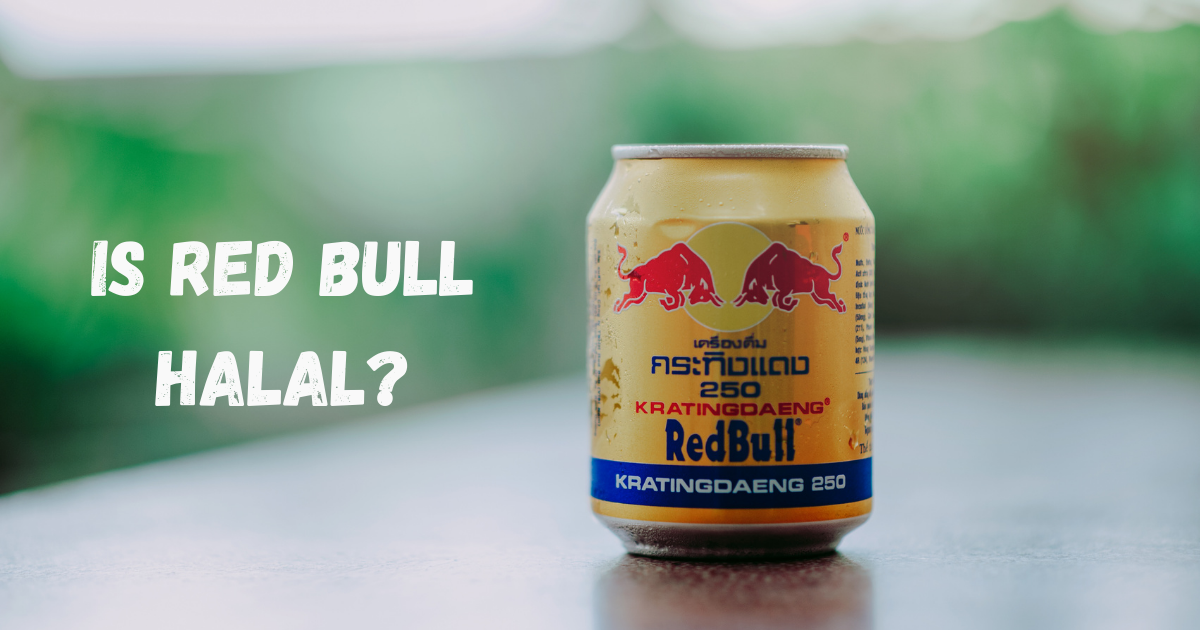Welcome to blog post topic is red bull halal. In the world of dietary choices, religious considerations play a significant role for many individuals. For those who adhere to Islamic dietary guidelines, such as following a Halal lifestyle, it’s essential to ascertain whether certain products align with their beliefs.
One such product that has sparked curiosity and discussions is Red Bull. In this exploration, we will delve into the question, “Is Red Bull Halal?” by examining its ingredients and certifications, aiming to shed light on its Halal status and help consumers make informed choices.
What is Red Bull?
Red Bull is a popular energy drink that originated in Austria and was created by Dietrich Mateschitz in the 1980s. It is one of the most well-known energy drinks globally and is marketed as a beverage that boosts energy, concentration, and physical performance.
Red Bull’s primary ingredients include caffeine, taurine, sugar, and various B-vitamins. The drink is widely available in various sizes and formats, often recognized by its iconic slim blue and silver can with two bulls charging at each other. Red Bull has gained immense popularity among individuals seeking a quick energy boost, athletes, students, and individuals with active lifestyles.
Main Ingredients In Red Bull
The Main Ingredients In Red Bull are
- Caffeine: Red Bull contains caffeine, a stimulant that helps increase alertness and reduce fatigue.
- Taurine: Taurine is an amino acid that is naturally present in the human body. It is often added to energy drinks for its potential role in supporting energy levels.
- Sugar: Red Bull contains sucrose and glucose, which provide a quick source of energy. However, there are sugar-free versions of Red Bull available as well.
- B-vitamins: Red Bull typically includes various B-vitamins, such as niacin (vitamin B3), pantothenic acid (vitamin B5), vitamin B6, and vitamin B12. These vitamins are important for energy metabolism.
- Water: Water is the primary liquid component in Red Bull, acting as a carrier for the other ingredients.
Are Red Bull Ingredients Halal?
The ingredients in Red Bull were not universally certified as halal. The halal status of Red Bull or any other product depends on the specific ingredients used and the production processes involved.
To determine whether Red Bull is halal, it’s essential to examine the source and processing of each ingredient.
Is taurine halal?
Taurine, in its pure form, is a naturally occurring amino acid found in the tissues of many animals, including humans. It is not an animal byproduct like meat or gelatin. As such, taurine itself is generally considered to be halal for consumption according to Islamic dietary guidelines.
However, in commercial products like energy drinks or supplements, taurine may be synthesized synthetically, which can involve certain chemical processes. In such cases, the halal status of the taurine used would depend on the source and manufacturing process.
If taurine is derived from halal sources and the production process adheres to halal standards without involving any haram (forbidden) elements, then it would be considered halal.
However, it’s important to note that the specific halal status of any product depends on the entire formulation and the certification obtained from a reputable halal certification authority.
Is Red Bull with Taurine Halal?
Red Bull, like many other commercial products, might have different formulations and variants distributed in various regions around the world. The ingredients and production processes may vary depending on the target market and local regulations.
If Red Bull is certified as halal by a reputable halal certification authority, it means that the ingredients, including taurine, used in the product meet the halal standards, and it is permissible for consumption according to Islamic dietary guidelines.
Are some kinds of Red Bull Haram?
- Alcohol Content
- If a Red Bull variant contains alcohol or any alcohol-derived additives, it would be considered haram as alcohol is forbidden in Islam.
- Non-Halal Ingredients
- Some food colorings, flavorings, or additives used in Red Bull or any other commercial product may not be halal. Any non-halal ingredients would render the product haram.
- Halal Certification
- Without a valid halal certification from a reputable halal certification authority, some individuals may consider certain Red Bull variants as haram due to uncertainty about the sourcing and manufacturing processes.
Red Bull: A Non-Alcoholic Drink
Red Bull is a non-alcoholic energy drink. It does not contain any alcohol as part of its ingredients. The primary components of Red Bull are caffeine, taurine, sugar or artificial sweeteners, and B-vitamins, which are all non-alcoholic substances.
Since Red Bull is a non-alcoholic beverage, it is not considered haram (forbidden) in Islamic dietary guidelines due to alcohol content. However, as mentioned earlier, the halal status of Red Bull or any other product can depend on the specific ingredients used and the production processes, so it’s essential to check for halal certification to ensure compliance with Islamic dietary laws.
Red bull variants
| Red Bull Variant | Halal Certified (Yes/No) | Ingredients | Additional Information |
| Original Red Bull | No | Caffeine, Taurine, Sugar, B-vitamins | No halal certification available. Consumers should verify current status. |
| Red Bull Sugar-Free | No | Caffeine, Taurine, Artificial Sweeteners, B-vitamins | Halal certification status may vary in different regions. |
| Red Bull Tropical | No | Caffeine, Taurine, Sugar, B-vitamins, Natural Flavors | Consumers should check for halal certification on the product label. |
| A Red Bull Zero | No | Caffeine, Taurine, Artificial Sweeteners, B-vitamins | Halal status might differ based on the production and sourcing process. |
Can Muslims Drink Red Bull?
Muslims can consume Red Bull if it is certified as halal by a reputable halal certification authority or if the ingredients used in the specific variant are known to be halal according to Islamic dietary guidelines.
Halal certification ensures that the product meets the requirements of Islamic dietary laws and is free from any haram (forbidden) substances, including alcohol and non-halal additives. If a Red Bull variant has a valid halal certification, it is considered permissible for Muslims to consume.
Why Is Red Bull Considered Haram By Some Muslims?
- Halal Certification: Some Muslims may consider Red Bull haram if it lacks halal certification from a reputable halal certification authority. Without a valid halal certification, there might be uncertainty about the sourcing and production processes, making it challenging to determine if the product is halal.
- Non-Halal Ingredients: In some cases, energy drinks, including certain variants of Red Bull, might contain ingredients that are not halal. This can include non-halal food colorings, flavorings, or additives that are derived from non-halal sources.
- Alcohol Content: Muslims are prohibited from consuming alcohol in any form, and some beverages may have alcohol-derived additives. If any Red Bull variant contains alcohol or alcohol-derived substances, it would be considered haram.
- Caffeine and Health Concerns: While caffeine itself is not considered haram, some Muslims may choose to avoid excessive caffeine consumption due to health reasons or personal beliefs.
Health safety concerns of red bull
Red Bull and other energy drinks have been a subject of health safety concerns due to their high caffeine content and other ingredients. Some of the key health safety concerns associated with Red Bull include:
- High Caffeine Content
- Red Bull contains caffeine, which is a stimulant that can increase alertness and energy levels. However, consuming excessive amounts of caffeine can lead to adverse effects such as nervousness, anxiety, rapid heartbeat, and insomnia.
- Cardiovascular Effects
- The combination of caffeine and other stimulants in energy drinks can put extra stress on the cardiovascular system, leading to increased heart rate and blood pressure. In some cases, this may pose a risk to individuals with underlying heart conditions.
- Dehydration
- Caffeine is a diuretic, which means it can increase urine production and potentially lead to dehydration, especially when consumed in large quantities.
- Sugar Content
- Regular Red Bull contains a significant amount of sugar, which can contribute to weight gain and dental issues if consumed in excess.
- Interactions with Medications
- Energy drinks like Red Bull may interact with certain medications or medical conditions, leading to adverse effects or reduced effectiveness of medications.
- Adverse Reactions
- Some individuals may be more sensitive to the effects of caffeine and other ingredients in energy drinks, leading to negative reactions such as headaches, dizziness, or gastrointestinal issues.
- Mixing with Alcohol
- Combining energy drinks like Red Bull with alcohol can be dangerous. The stimulating effects of caffeine may mask the depressant effects of alcohol, potentially leading to risky behaviors and an increased risk of alcohol-related injuries.
Conclusion
In conclusion, Red Bull is a popular energy drink known for its ability to provide a quick energy boost due to its main ingredients, including caffeine, taurine, sugar or artificial sweeteners, and B-vitamins.
However, Red Bull, like other energy drinks, has raised health safety concerns.
Some of the health safety concerns associated with Red Bull include its high caffeine content, which can lead to adverse effects such as nervousness, anxiety, rapid heartbeat, and insomnia when consumed in excess.
The combination of caffeine and other stimulants in energy drinks can also put extra stress on the cardiovascular system, potentially affecting individuals with underlying heart conditions. Additionally, the sugar content in regular Red Bull can contribute to weight gain and dental issues if consumed in large quantities.
In summary, while Red Bull can offer a quick energy boost, it should be consumed responsibly, and individuals with health concerns or dietary restrictions should consult with healthcare professionals or seek products with suitable certifications to make informed decisions.
Frequently Asked Questions
There are some FAQs about is red bull halal
Is Red Bull Harmful?
Red Bull can be harmful if consumed excessively due to its high caffeine content, which may lead to adverse effects like nervousness, increased heart rate, and insomnia.
Is Taurine Haram?
Taurine itself is not haram; it is a naturally occurring amino acid. The halal status of a product containing taurine depends on the overall ingredients and production process.
Is Caffeine Haram For Muslims?
Caffeine itself is not haram, but its consumption should be in moderation and in accordance with Islamic dietary guidelines. Excessive or harmful use may be discouraged.
Is Red Bull Haram In The US?
Red Bull itself is not considered haram in the US, but its halal status depends on the specific ingredients and production processes, so Muslims should check for halal certification or verify with the manufacturer.
Is Red Bull Halal Certified?
Red Bull did not have a universal halal certification.
- “Is Lobster Halal? Understanding Its Permissibility”
- “Is Drawing Haram in Islam? Understanding the Perspective”
- “Is Fermented Kimchi Halal? Exploring Kimchi’s Halal Status”
- “Is Collagen Halal? Unveiling the Halal Status of Collagen”
- “Is Wine Vinegar Halal? Unveiling Its Permissibility”


